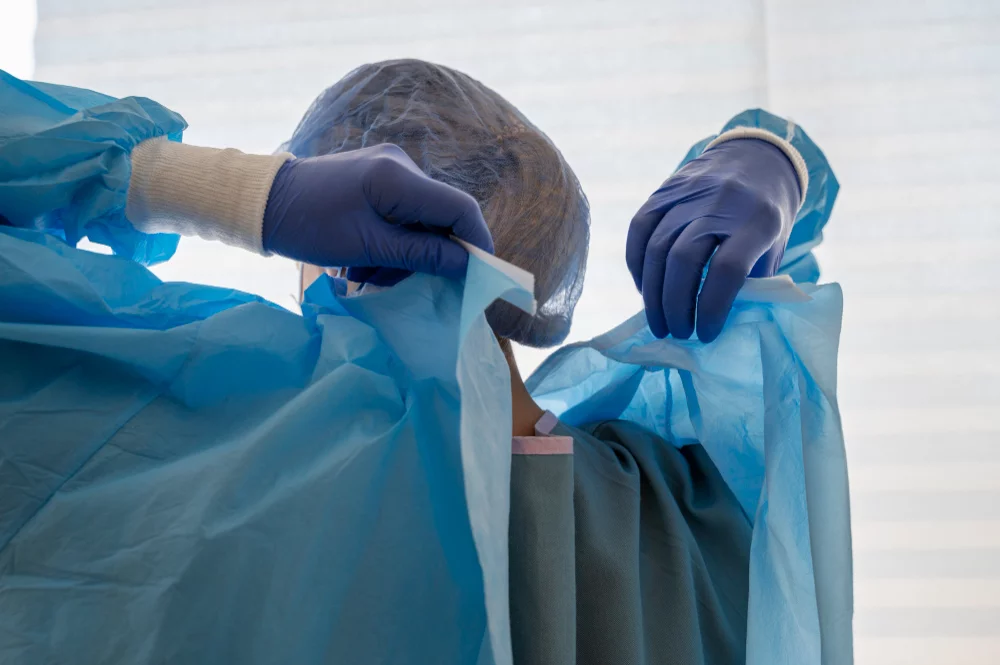Bypass surgery on a working heart refers to bypass surgery performed while the patient's heart is working and without being connected to a heart-lung machine. In this way, the working functions of the heart are preserved and complications that may arise during the process of stopping the heart, connecting it to the heart-lung machine, and ensuring blood flow to other organs with the heart-lung machine are prevented. After the tests, analyzes and evaluations, if there is suitability, the specialist physician decides on bypass surgery to be performed while the heart is working. The surgery is performed by bridging a vein taken from another part of the body to the heart vein, while the heart continues its work. In patients who are not connected to a heart-lung machine, the risks of some complications that may occur in other organs after surgery are also reduced.
İçindekiler Tablosu
Bypass in the Working Heart

The vessels that feed the heart are called coronary arteries or coronary veins. There are 3 coronary arteries that feed the heart. Coronary artery diseases may occur due to blockages or narrowings in these coronary vessels. In these cases, the heart cannot receive enough nutrition and sudden complete blockage may cause heart attacks. Coronary bypass surgery is performed in cases of stenosis and blockage in these vessels, by bridging the vessels taken from other parts of the body to the vessels in the heart and ensuring blood flow.
How is Bypass Done in a Working Heart?
Genelde bypass in working heart ameliyatlarının bir kaç giriş yöntemi vardır. Bunlardan biri göğüs alt ucundan 5-6 santimlik bir kesi olabileceği gibi bazen meme altından 4-5 santimlik bir kesi, bazen göğüs sol yayından 6-7 santimlik bir kesi gibi tekniklerdir. Eğer ki bypass çoklu damarı kapsıyorsa üç damar ve üzerinde olduğunda göğüs ön kemiği kısmi olarak açılır. Bunun birçok avantajları vardır. Kemik tamamen açılmadığı için, parsiyel yani kısmi açıldığı için hastanın enfeksiyon riski düşük olduğu gibi göğüs kemiği daha çabuk kaynar.
Which Patients Should Not Have Bypass with a Working Heart?
Patients with renal failure,
-Patients who do not fulfill heart contraction functions
-Individuals with lung disease,
-People who have had a stroke before,
-Bypass method should not be applied to working heart patients who are being treated for cancer or whose treatment is ongoing.

In Which Patients Is Bypass Advantageous for a Working Heart?
Although the heart-lung machine is more advantageous in elderly patients who are considered to have serious effects, and in patients with certain diseases and dysfunctions such as heart, diabetes, lung and kidney diseases, it is important for the success of the treatment to be carried out in appropriate hands who are knowledgeable, experienced and expert in this regard.
What are the Advantages of Bypass Surgery for a Working Heart?
The biggest advantage of bypass surgery performed while the heart is working is that it has great advantages in elderly patients with lung problems, diabetes, and kidney disorders. Since the heart is not stopped, first the lungs, then the kidneys, and sometimes the brain if paralyzed, are not affected. Therefore, heart surgeries in which the heart is not stopped and the heart's blood and the body's blood are not transferred to the heart-lung pump can be tolerated by the patient as easily as natural appendicitis surgery. The patient does not experience any problems in risky areas after surgery. These are vital organs such as kidneys, brain and lungs. For this reason, bypass surgeries performed without stopping the heart are much more advantageous than other standard surgeries performed by stopping the heart. It is of great importance that this is done widely all over the world and that there are experienced surgeons in many centers and places that have survived to this day. These are the most advantageous bypass techniques for those with heart disease and those with diabetes, kidney, lung and brain problems at an older age.
In bypass surgeries performed on the functioning heart, performed with minimally invasive surgical technique, there is less bleeding and therefore less blood requirement during the surgery, and patients can be discharged earlier after the surgery and can return to their daily lives. It provides high comfort to the patient during the recovery process after bypass surgery. In addition, reducing the risk of infection and complications is among the other advantages of bypass surgery performed on a functioning heart.
Make an Appointment
Error: Contact form not found.


